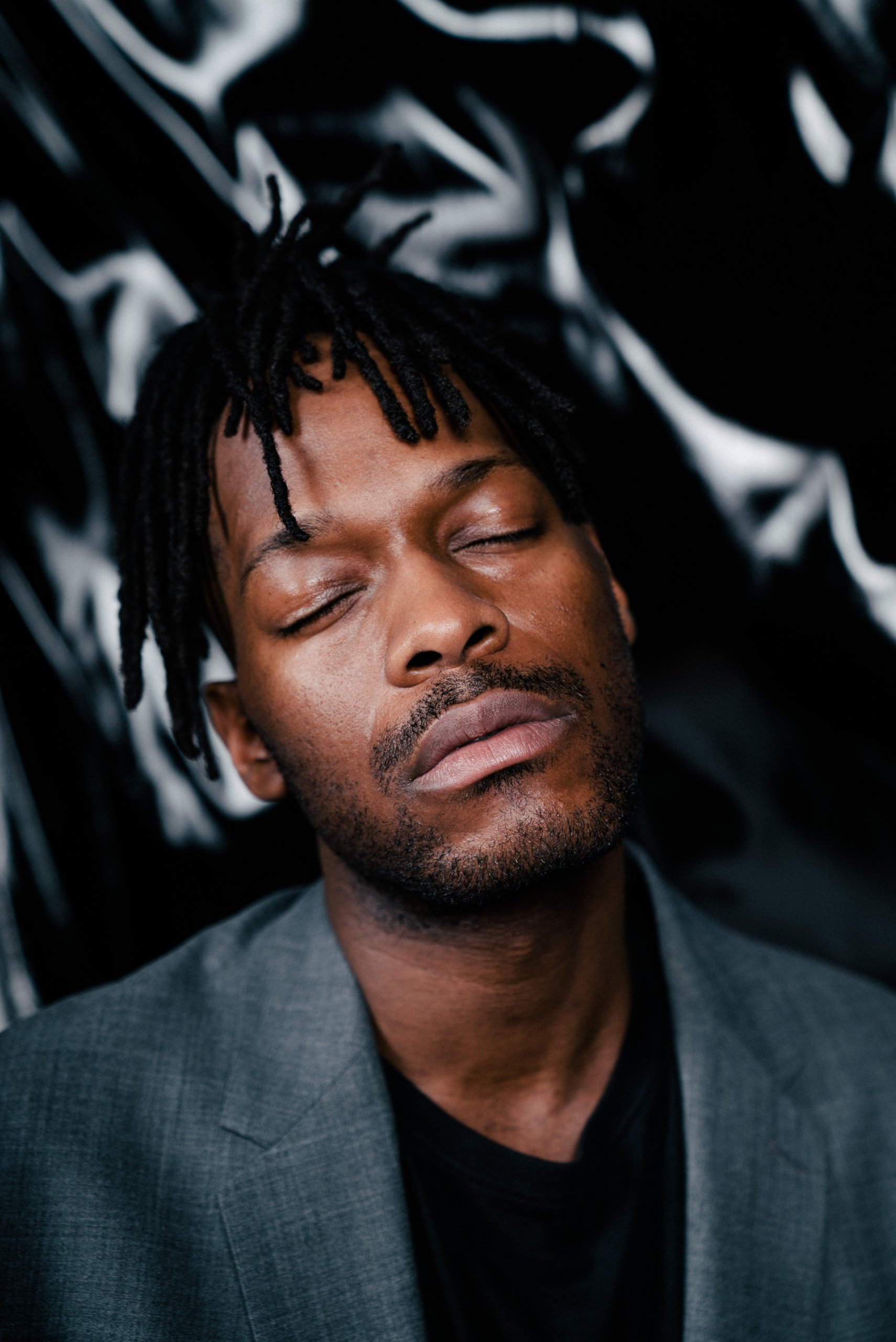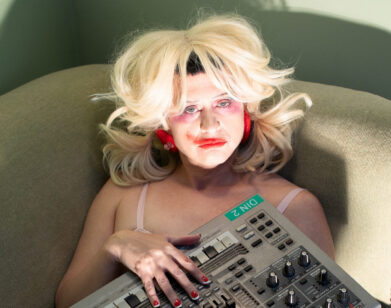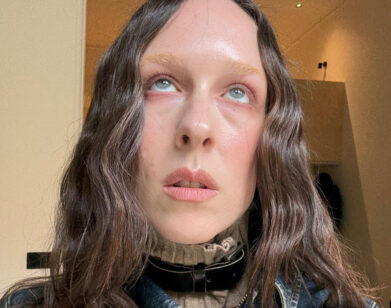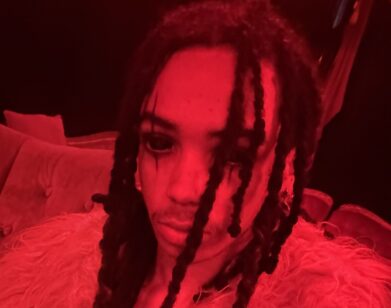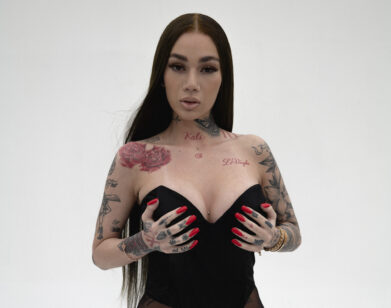Zebra Katz Claims The Anti-Throne
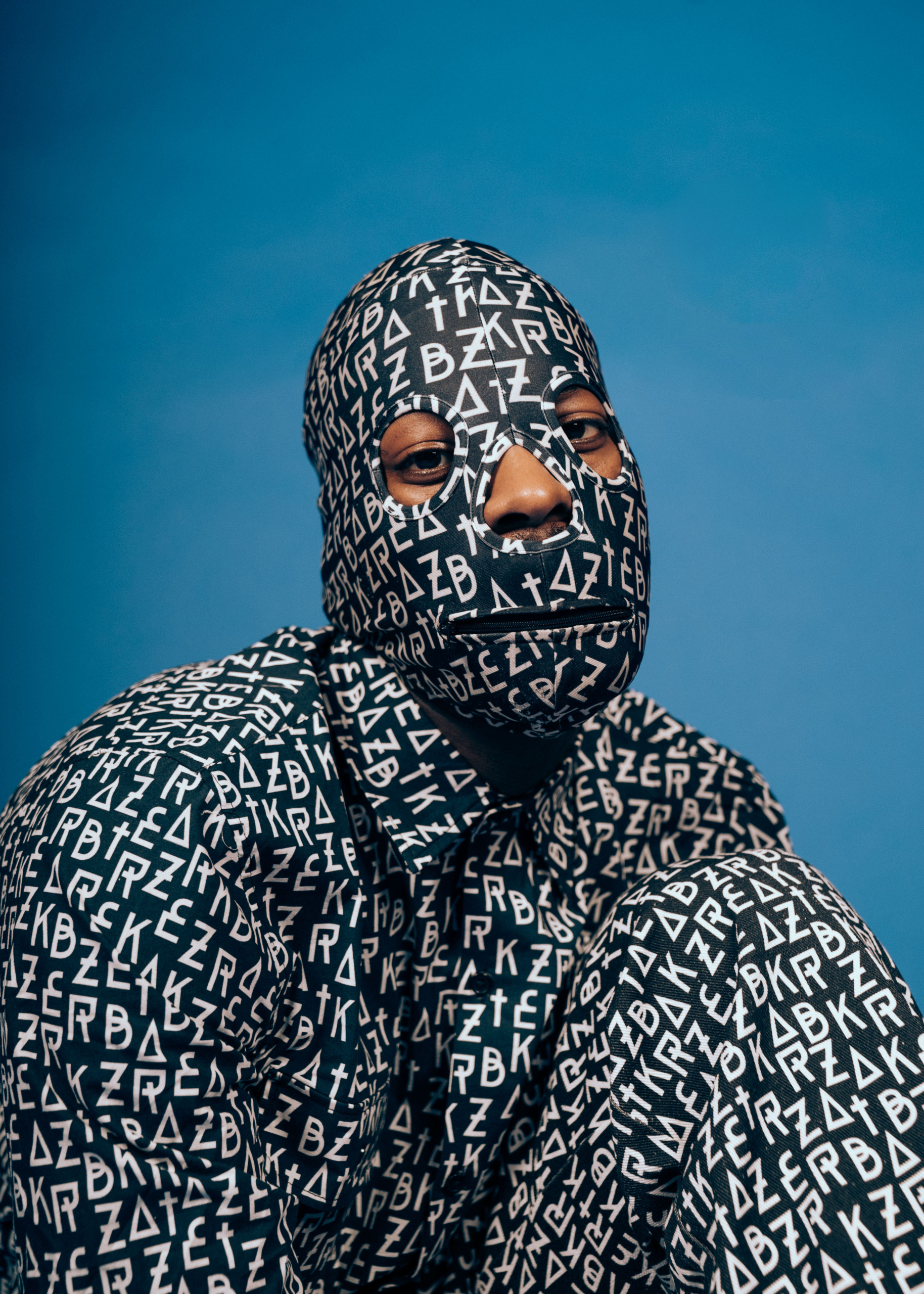
Upon first hearing Zebra Katz’s breakthrough track “Ima Read,” one may need to reach for the Ativan in the medicine cabinet—or, as Katz himself does in the music video, a blazer. The track’s four-minute bass line is sticky, thumping, and unnerving; the lyrics, threatening. “Ima take that bitch to college/Ima give that bitch some knowledge,” Katz raps in his signature low husk, invoking the language of drag queens and 1980s ball culture. When Ojay Morgan—the first-generation Jamaican-American artist behind the Zebra pseudonym—released the track onto the internet airwaves in 2012, it was soon picked up by Diplo‘s Mad Decent imprint Jeffree’s, remixed by Azealia Banks, and stretched to 11 minutes for the Rick Owens show during Paris Fashion Week, where masked models stomped defiantly in floor-length brown minimal wear as a line of fire blazed behind them.
But if Morgan’s first two EPs, “Winter Titty” and “Drklng,” didn’t hit hard enough, on his debut album Less is Moor, he’s swinging for the fences. Laced with disjointed, villainish electronica, the album distills style, braggadocio, and queer defiance into a potent, potentially poisonous tonic. “The dark lord of the fashion world,” as Billboard calls him, Katz is about ready to claim the anti-throne. As the poet Camae Ayewa, or Moor Mother, tells him, this album is a little bit more “fuck you.” More is moor. —SARAH NECHAMKIN
———
MOOR MOTHER: How are you?
ZEBRA KATZ: Hello, my dear. I’m very well. I’m going through my first album roll out. It’s been one hell of a journey getting to this point so I will be extremely relieved to say the least.
MOOR MOTHER: You know it’s going to get even crazier once the album comes out.
ZEBRA KATZ: That’s what they say.
MOOR MOTHER: So you got to get some boundaries right now, you know?
ZEBRA KATZ: Right. I’m trying to be mindful of the fact that this is a challenge that I signed up for, and also take the space to make sure I’m okay in the process of performing and being out in the public eye in that way.
MOOR MOTHER: It’s the thing that no one says to you. Once everything starts, no one tells you how to take time for yourself.
ZEBRA KATZ: Exactly. And then how do you prepare for when it’s over and there’s no more attention. What happens then, you know? Is it down time or do you go back to hustling?
MOOR MOTHER: Your live shows are pretty out there. Are they planned at all?
ZEBRA KATZ: Not at all. I’m still at the point where I show up to a venue and just hope they received my rider. Hopefully I get to meet with the sound and light technician, and hopefully they speak my language. Usually they’re used to working with a tour manager, which I don’t have. So you kind of just have to work with what’s been given to you. It also speaks to what I’m getting at in the album, about always being given less and being expected to perform more.
MOOR MOTHER: What was the journey to making this debut album like for you?
ZEBRA KATZ: Back in 2012, I released “Ima Read” which I created on GarageBand and back in the MySpace days. Then I released “Champagne Cocaine” and “Hey Ladies” and those were my first songs made in a studio with an engineer. I re-released “Ima Read,” and then it was picked up by Rick Owens in his runway show. After that I was asked to perform at South by Southwest. That’s when I decided to quit my day job. I had to quickly make more songs to perform. After that I toured a bit and now I’m like, “Fuck. I’m a musician.”
MOOR MOTHER: Well, the new album definitely has a different mood—a little bit more “fuck you.”
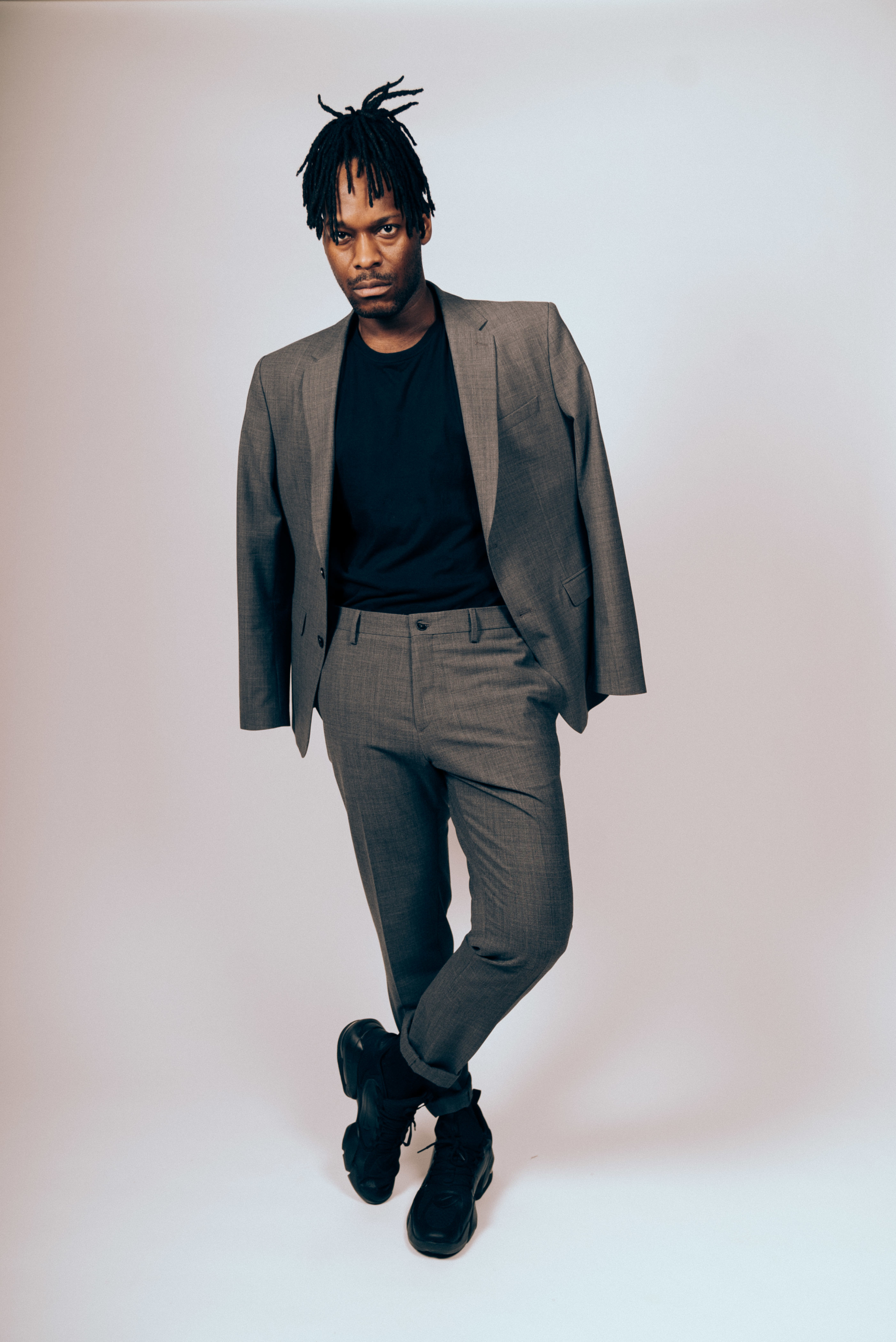
ZEBRA KATZ: It’s definitely a lot moodier. I think that’s also because I wanted to make an album that reflected the desperate and crazy times we’re living in right now. It’s a story. I’m really looking forward to people hearing it as a whole piece: the abrasive moments and the vulnerable ones.
MOOR MOTHER: You produced this album mostly in the UK right?
ZEBRA KATZ: Right. I brought in other producers like Sega Bodega, who was really eager to help me get that dirt, that industrial sound.
MOOR MOTHER: How many songs did you make that didn’t make it on there?
ZEBRA KATZ: I think there are maybe ten tracks that didn’t make it onto the album. It’s already at 15.
MOOR MOTHER: You know I’m already eyeing up two tracks to remix.
ZEBRA KATZ: Ooh, I like it.
MOOR MOTHER: When I finish a new record, I instantly want to start making the next one, you know? I feel like I abandoned the songs that don’t make it on the album. Do you have plans already for the next album?
ZEBRA KATZ: I’m so ready to start working on it. I want to continue to challenge myself and work with things that go against the grain. On this album, everyone was telling me I needed some big names. I was like, “That’s what you think!” I think now I’ve made that statement, that I can do things my way, and now love to collaborate with other artists.
MOOR MOTHER: Are there any dream artists that you’d like to collaborate with?
ZEBRA KATZ: Absolutely. Grace Jones is the end all be all for me.
MOOR MOTHER: Is there a turning point that made you feel like you’d really made it to a new level as a musician?
ZEBRA KATZ: I think after touring with the Gorillaz and working on three tracks with them, I knew that it was time to put something out. When I was on tour with them, I got to see people like Vince Staples and other artists who put full bodies of work out with the help of a manager and a label. I was like, “It’s time to build a team because I can’t continue to do this alone.” But ultimately it was the financial aspect that motivated me. I had no idea how much it would cost to put an album out as an independent artist.
MOOR MOTHER: Yeah. They don’t tell you how hard it’s going to be.
ZEBRA KATZ: There is a lot that people don’t talk about in this industry and I think it’s because they like their artists to be naïve. I was touring five years straight, and it wasn’t until maybe my fourth year that anyone was like, “Zebra Katz, are you okay? You haven’t been home in like six months.”
MOOR MOTHER: Damn.
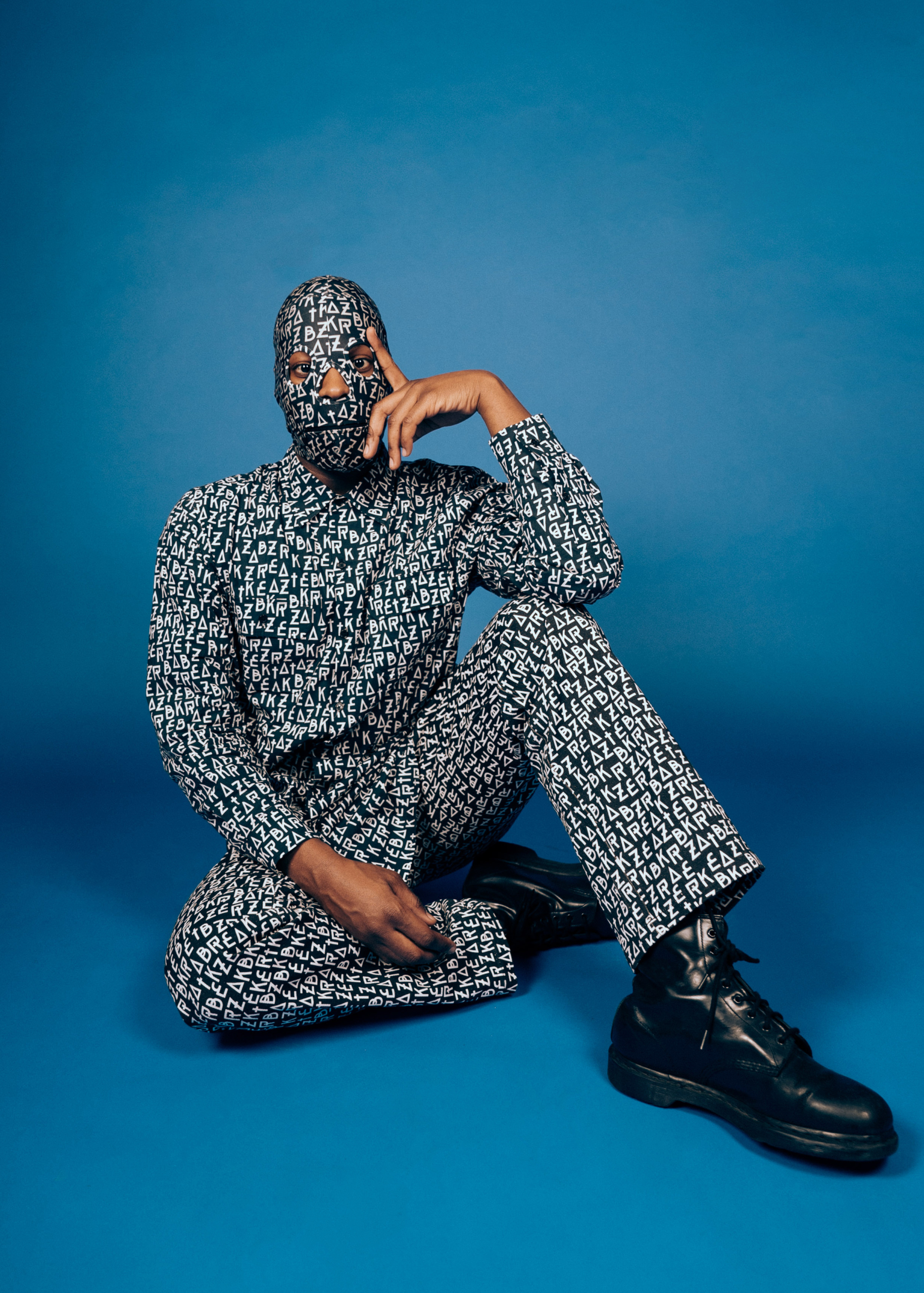
ZEBRA KATZ: But I was so into it, you know? Like, “Oh my God, I’m having these experiences,” and I really wasn’t putting myself first. So after the Gorillaz tour, I moved to Berlin because it’s cheap and affordable. Then I just had to isolate myself long enough to really create a body of work that was my own.
MOOR MOTHER: There’s this idea of idol worship within the industry. Mangers and labels want to align you with other artists… Like, Grace Jones can be one of your favorite artists, but I’m sure you don’t want to just follow in every footprint that she walked in. It’s this misconception that we all need to be carbon copies of celebrities instead of having them lift us up higher than them. Is it important to you to connect with other musicians to talk about these kinds of problems?
ZEBRA KATZ: I feel like I’ve always been vocal about the position I’ve been blessed to be in. I’m a musician that people are engaging with. I get messages from other musicians who are like, “I see you played this festival in Russia, is it safe for me? Did they pay you?” I always respond because I think we need to have this dialogue. Because the industry, for all its talk about creating safe spaces, really doesn’t care about artists unless they’re backed by a label and they’re unattainable. It’s that star power.
MOOR MOTHER: They’re not interested in marginalized artists until you’ve already made it.
ZEBRA KATZ: I even fall victim to it too. Busta Rhymes reached out being like, “I want to remix ‘Ima Read.’” I never imagined he would have ever heard of me. But that’s our era. Our idols could be watching us secretly, cheering us on, and we don’t even know.
———
Grooming: Wataru Suzuki using Oribe and CHANEL
Set Design: Carina Dewhurst
Assistant: Shauna Summers

